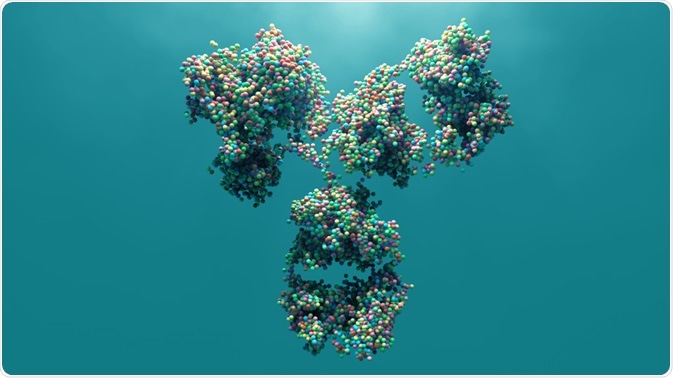Recent years have seen therapeutic antibodies, specifically, monoclonal antibodies, grow rapidly in their use in treating a range of diseases and illnesses including cancer, inflammatory and autoimmune diseases, cardiovascular disease, respiratory disease, ophthalmologic disease, as well as tackling infection in the form of some vaccines, and complications related to organ transplantation.

Image Credit: Design_Cells/Shutterstock.com
Research continues and various new applications of therapeutic antibodies are currently being explored. The establishment of various immunotherapies such as antibody-based drugs has significantly advanced the treatment of disease, particularly cancer.
Why use antibodies in the treatment of disease?
There is always a demand for more effective therapeutics, enhancing the responsiveness to treatment, lowering mortality rates and increasing the quality of life, whilst being cost-effective and overcoming the limitations of conventional treatment options.
The use of therapeutic antibodies is a successful alternative therapeutic option for many diseases.
Scientists have developed treatments that can directly target molecules to tackle the cause of illnesses. The therapeutic antibody process is highly effective as it is specific to target antigens, resulting in fewer side-effects.
A wide range of molecules can be targeted by the method, meaning that a diverse range of diseases can be treated.
Large scale manufacturing of antibodies has been made possible by significant advances in the fields of engineering technology and recombinant manufacturing technology resulting in increasing availability and lowering costs of production of antibody-based therapies.
How do therapeutic antibodies work?
Therapeutic antibodies are based on the natural behavior of antibodies to target and interact with (usually by attaching to and breaking down) specific antigens on the surface of cells.
The first step of developing an antibody therapy is to identify a target antigen on the pathogen; these are molecules that are specific to the illness being targeted.
This can be done in several ways, usually involving the analysis of blood samples of patients with the disease and comparing the profiles of molecules with those obtained from healthy blood samples. Once the molecular targets have been established, antibody therapy can be designed in several ways.
Neutralization
Some antibodies are designed to prevent the target molecule from functioning in a manner that is related to the pathology. The antibodies bind to the target on the cell surface, preventing it from, therefore, inhibiting the pathogenic effects.
This type of antibody treatment, known as neutralization, is a common method used to treat tumors. Studies have shown that in blocking the activity of the target molecule, the activity of the tumor cells can reduce, and proliferation can be inhibited.
Antibody-dependent cell-mediated cytotoxicity (ADDC) and Complement-dependent cytotoxicity (CDC)
The ADCC method involves recruiting the body’s natural immune responses to attack and kill target cells. It is achieved when the antibodies bind to a target antigen and recruit the immune system’s macrophages and natural killer cells to bind and lyse the target cell.
Complement-dependent cytotoxic (CDC) is similar to ADCC, the antibody binds to the target antigen and results in the formation of a membrane attack complex resulting in the lysis of the target cell. Both are well established in the field of oncology.
Drug delivery carrier
Finally, antibodies can be used to transport and deliver drugs, radioisotopes, toxins or cytokines to their required location within the body. This is achieved by conjugating these substances to the antibody, resulting in drug delivery that is highly targeted and therefore causes less damage to the surrounding healthy cells.
References:
- Hashimoto, G., Wright, P. F., & Karzon, D. T. (1983). Antibody-dependent cell-mediated cytotoxicity against influenza virus-infected cells. Journal of Infectious Diseases, 148(5), 785-794.
- Hussain, S. R. A., Cheney, C. M., Johnson, A. J., Lin, T. S., Grever, M. R., Caligiuri, M. A., ... & Byrd, J. C. (2007). Mcl-1 is a relevant therapeutic target in acute and chronic lymphoid malignancies: down-regulation enhances rituximab-mediated apoptosis and complement-dependent cytotoxicity. Clinical cancer research, 13(7), 2144-2150.
- Marshall, M.J.E., Stopforth, R.J. and Cragg, M.S. (2017). Therapeutic Antibodies: What Have We Learnt from Targeting CD20 and Where Are We Going? Frontiers in Immunology, 8.
- Schroeder Jr, H. W., & Cavacini, L. (2010). Structure and function of immunoglobulins. Journal of Allergy and Clinical Immunology, 125(2), S41-S52.
- Suzuki, M., Kato, C. and Kato, A. (2015). Therapeutic antibodies: their mechanisms of action and the pathological findings they induce in toxicity studies. Journal of Toxicologic Pathology, [online] 28(3), pp.133–139.
Further Reading